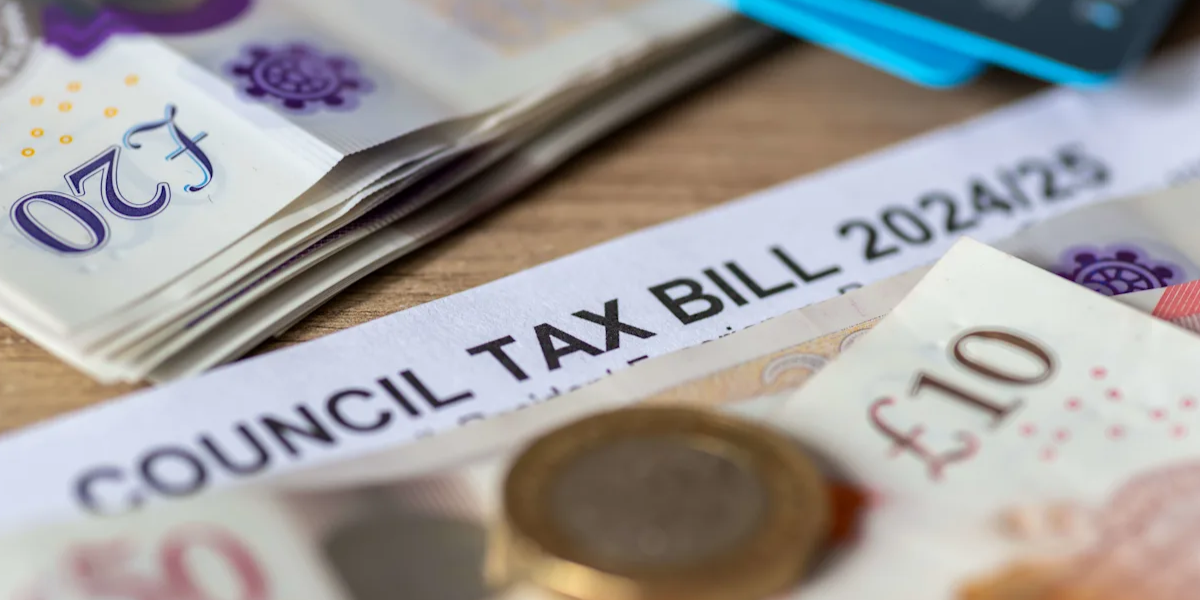You’re getting ready to move, boxes everywhere, address changes piling up, and then you remember something important: your council tax. Many people forget this part until bills or letters start coming to the wrong house. Talking about Council Taxes when moving house in the UK, it simply means you must tell both your old and new councils about your move so your payments stay fair and correct from day one.
In short, when you move home, your old council tax ends on the day you leave, and your new one starts when you move in. It’s that simple, but missing a single step can lead to overpaying or getting fined.
Let’s go step by step in detail so you know exactly what to do and avoid any confusion later.
Key Takeaways:
|

Council tax is a local tax that helps your council pay for public services like rubbish collection, street lighting, and local schools. You pay it based on where you live and the value of your property (its council tax band).
In short:
So when you move house, your council tax changes because your address and the local council change too.

Below is a detailed, step-by-step guide (2025) to what you need to do about Council Tax when moving house in the UK, from before the move, during, to after.
Laws and procedures can vary slightly by local council, so always check your specific council’s website too.
Before moving, check the tax band of your new property. You can easily find this on the Valuation Office Agency (VOA) website.
Why it matters:
Example:
If your old house was in Band C and your new one is in Band E, your monthly council tax for home moving may increase.
You must inform your old council that you’re leaving the property. You can do this online on your local council’s website (for example, the London councils’ portal).
Why this is important:
Tip:
Do this at least two to three weeks before you move out so the council can prepare your final bill in time.
Once you know your move-in date, inform your new council right away. They will set up your new council tax account and send you the first bill.
You can inform your new council easily online through their official website. Every local council in England, including London boroughs, has a “Moving Home – Tell Us You’ve Moved” section on their council tax page.
To find yours quickly, just go to the “Find Your Local Council website.” Enter your new postcode, and it will take you directly to your council’s website, where you can update your address and set up your new council tax account in minutes.
Here, you’ll have quick online forms where you just fill in:
That’s it. Within a few days, your new council tax account gets active.
When you move, you don’t pay double council tax.
Your old bill should stop the day you leave, and your new one starts the day you move in.
Example:
Always double-check your move-in and move-out dates to make sure you’re not paying for overlapping days.
After your old council closes your account, they’ll send you a final bill. If you’ve paid extra (for example, by monthly direct debit), you’ll get a refund. If you owe a little, you’ll get a small final payment request.
Keep your last few payments recorded or saved as proof. Sometimes refunds go to your old account, and you’ll need to update them.
When you move into a new home, it’s important to check if you can get a Council Tax discount or reduction. Many people don’t know they might qualify for one.
Let’s go through it step by step.
So, even if one of you moves out, the other still needs to make sure payments continue unless the council updates your details.
Now, here’s something important.
Some people don’t count when the council works out how many adults live in your home. That means you might be able to get a discount on your Council Tax bill.
You’re not counted if you are:
So, if people in your home fall into these groups, your Council Tax amount could go down.
If everyone in your home is disregarded, you’ll get 50% off your Council Tax bill. If you’re the only adult counted (and everyone else is disregarded), or if you live alone, you’ll get 25% off your bill.
That’s a pretty good saving, so it’s worth checking!
Even if you’re disregarded, you must apply for a discount or exemption. It doesn’t happen automatically.
Once there, choose your council, and you’ll see the Council Tax discount or exemption section. They’ll ask for proof depending on your situation (like student documents, medical letters, or carer details).
If you’re an apprentice, you’ll need to show a declaration from your employer that says:
Always keep copies of:
These help if there’s ever confusion about double-charging or incorrect billing.
If you forget to tell the council you’ve moved, a few things can go wrong:
In London, every borough has its own council and tax rate. That means your amount can change a lot depending on where you live.
Example:
You can check your borough’s rate on your local council website or the London Councils website.
Once your new account is active, set up how you want to pay:
Direct debit is the easiest because it keeps your payments on track without late fees.
When you change your address, don’t forget to also:
It helps avoid confusion with bills and keeps your records accurate.
| Time | What to Do | Why It Matters |
| 3–4 weeks before moving | Check the new council tax band | Helps you plan your budget |
| 2–3 weeks before moving | Inform your old council | So they stop charging you |
| On moving day | Record move-out and move-in dates | Ensures correct billing |
| Within 1 week after moving | Inform the new council | So you get your new bill fast |
| After moving | Reapply for discounts | To save money |
| After final bill | Keep records | Helps if there’s a dispute |
Council tax might seem boring, but handling it right when moving house saves time and money. Always inform both councils early, check your dates carefully, and keep all your records safe.
By performing all the steps regarding Council Taxes when moving house in the UK, you can avoid double payments, get quick refunds, and start fresh in your new home without any surprise bills.
Plus, when you plan your move, it also helps to hire a removals company, like Easy Way Removals, to handle your packing and shifting smoothly. This way, you can focus on sorting your council tax and paperwork while the movers take care of the heavy lifting.
Yes, you can. If you paid your council tax in advance and move out before the period ends, your old council will refund the extra amount. Just make sure you tell them your exact move-out date and give them your forwarding address so they can send the refund quickly.
If your new home was empty for months, the council might review the property’s status. Sometimes you may get a short discount, or the previous owner may owe an empty property charge. Once you move in, you become responsible for council tax from your move-in day, not before.
It depends on your rental type. If you rent the whole house, you usually pay it yourself. If it’s a shared house or student flat, sometimes the landlord includes it in the rent. Always check your tenancy agreement so you know who’s responsible before you move.
Don’t wait too long. Most councils ask you to inform them within 21 days of your move. But it’s even better to tell them a week or two before moving so they can sort your bills on time and avoid any mix-ups or fines.
If you move to another house in the same council area, you still need to tell them. They’ll close your old account and open a new one for the new property. It’s quick to do online, and it makes sure your bills stay correct.
No, you can’t transfer your account to another person. Council tax is based on who lives in the home, not the account itself. If someone new moves in, they need to register with the council in their own name.
You still need to tell the council. Some councils give short-term discounts for empty homes, while others charge extra if it stays empty for months. Let them know if it’s temporary or long-term so they can bill you properly.
Yes, full-time students don’t pay council tax. But you still have to tell your new council that you’re a student and show proof from your college or university. If you forget, you might get billed by mistake.
Usually, you don’t have to cancel it right away. Wait until your final bill arrives because your council might refund any extra payments directly to that same account. Once the refund clears, you can cancel the old direct debit safely.
No problem. Just inform both councils. Your old one will close your account and refund any balance, and your new one will start your new account. You might see different rates because every city sets its own council tax prices.
If you and your housemate move out on different days, tell the council both move-out dates. Each person will be responsible only for the days they lived there. This helps the council charge everyone fairly and avoids confusion later.
Don’t panic, but act fast. Call or email your old council and explain that you’ve already moved. Give them your move date and new address. They’ll correct your records, close your account, and issue a refund if you overpaid.
That means someone else is registered as the main occupier. If you live there, too, tell your council to add your name to the bill. It’s important because being named makes you legally responsible for your share of the payment




